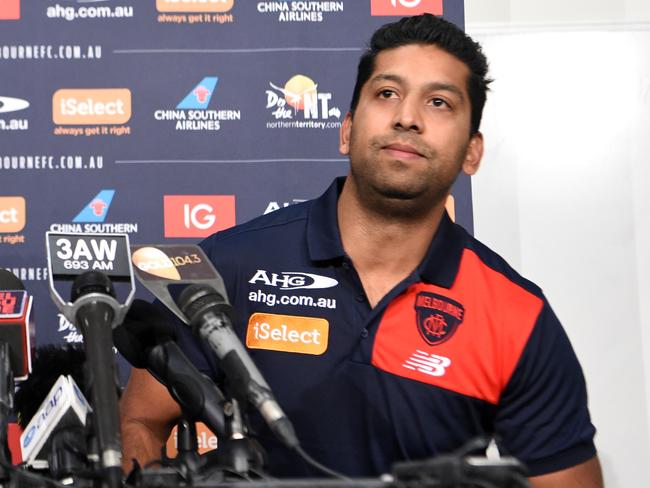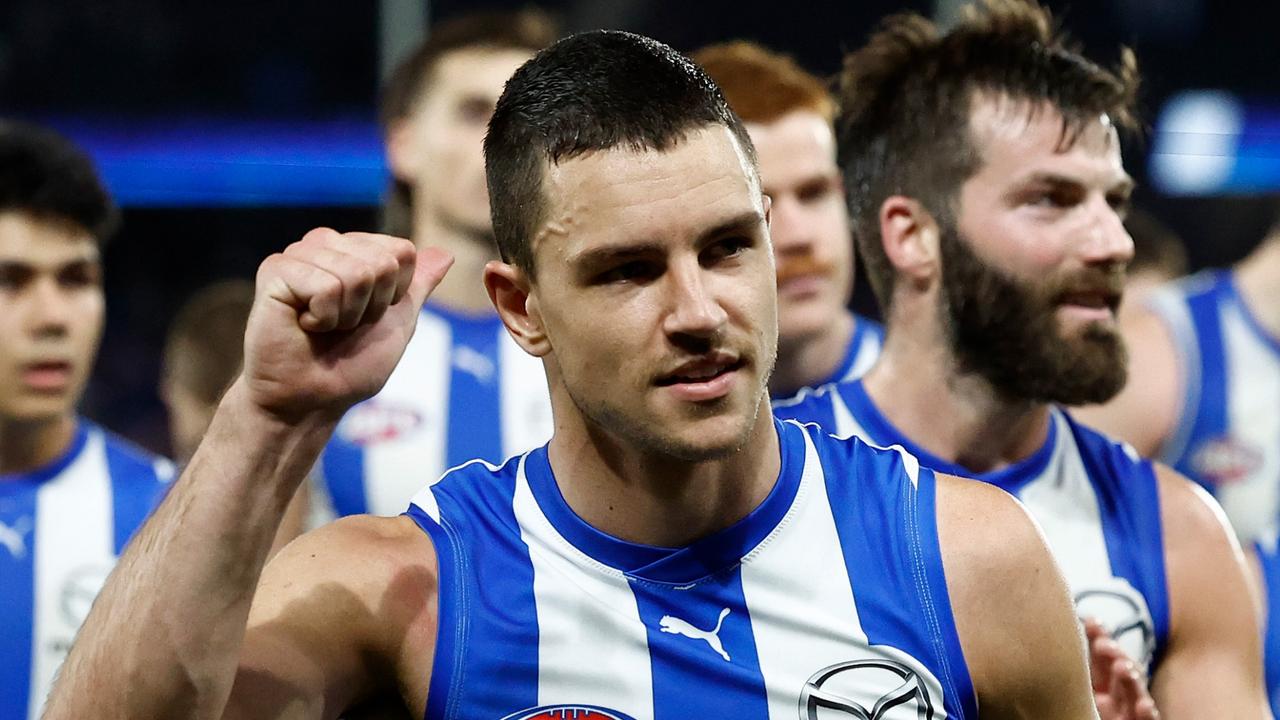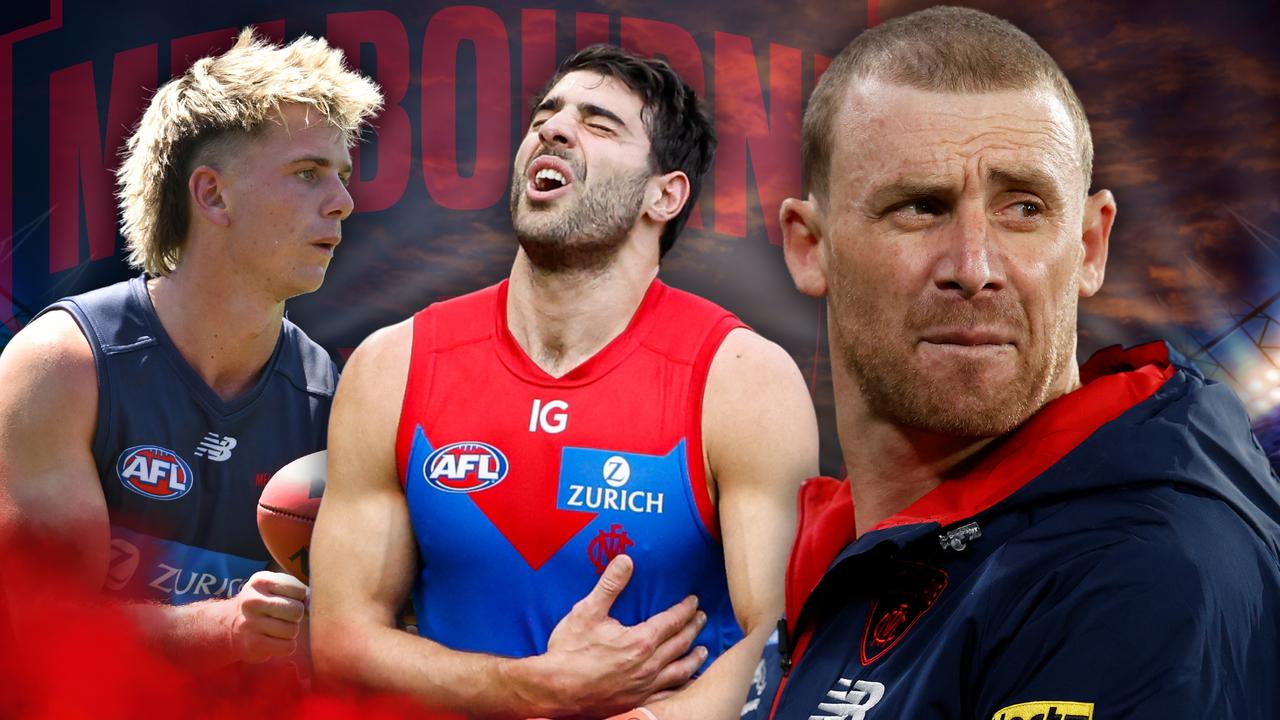About 100 current AFL players have secret immunity from three-strike drugs policy
Footy insiders have revealed the extent of the clandestine scheme involving players from all 18 clubs who are given free rein to take drugs without penalty.

AFL
Don't miss out on the headlines from AFL. Followed categories will be added to My News.
About 100 current players have been granted secret immunity from the AFL’s three-strike drugs policy, clubs’ medical officials say, as the league is accused of “aiding and abetting” illegal drug abuse.
And the number of players given free rein to take drugs without penalty is climbing.
The football world was rocked on Tuesday night when federal MP Andrew Wilkie exposed evidence of “off the books” drug tests facilitated by the AFL, in revelations that stunned club chief executives, presidents and coaches.
Under the secret scheme, medico insiders have revealed to the Herald Sun that players who register a positive result in the days before a game are advised by their doctors to fake a minor injury or claim to have an illness so they are pulled from the team and cannot be caught by Sports Integrity Australia (SIA) tests on game day.

A defiant AFL declared on Wednesday that it was “unapologetic” over the emergence of the secret scheme, saying it was committed to “player wellbeing and welfare” and claiming because the players were not taking the field, they were not breaching anti-doping rules.
“We’re talking about a very small handful of players and it is private medical information,” league boss Andrew Dillon said.
But footy insiders said clubs were actively identifying cocaine users and placing them in what is called “the medical model”, where strikes are not counted.
“Even the cleanest clubs would have about five players on this so-called rehabilitation program,” one insider said.
“Some would have far more. Across 18 clubs we are talking maybe 100 players.”
Two other club medico sources confirmed the numbers.
One club insider described the whole program as “a mechanism to cover up drug use”.
Under the AFL’s three-strike drug policy, a second positive test outside match day would normally result in the player being named and shamed, fined $5000 and suspended for four games, with a third strike seeing them rubbed out for another 12 matches.
Positive match-day tests, which are overseen by SIA, could lead to a four-year ban.
SIA said on Wednesday it had started assessing allegations made by Mr Wilkie in parliament, but would make “no further comment at this stage”.
The drugs saga reignited in Canberra when the Albanese government stymied a second attempt by Mr Wilkie to table whistleblower documents relating to the revelations, after he was first blocked on Tuesday night.
A signed statement by former Melbourne Football Club doctor Zeeshan Arain, in which he details how the AFL’s former chief medical officer Dr Peter Harcourt facilitated clandestine testing for Demons players, is included in the documents.
“We now know that there’s a secret game happening behind AFL games, and the government needs to act urgently to stop this,” Mr Wilkie told the parliament on Wednesday.

Prime Minister Anthony Albanese said the claims had been referred to SIA.
“My job is not to … control the Australian Football League,” Mr Albanese said.
Dees coach Simon Goodwin said he had no knowledge of the alleged secret tests or players faking injuries.
Coaching legend Mick Malthouse said: “I can’t describe how angry I am. This is almost on the same level as the Essendon (supplements) saga, in fact it might even go beyond that, because this is suggesting AFL officials are involved.”
Goldstein MP Zoe Daniel said the allegations were serious and went to the duty of care the AFL had to its players.
“The point of this debate is what drugs can do to clubs and players, a culture of normalisation of cocaine use and in some cases addiction,” she said.
“In his statement, Dr Zeeshan Arain says ‘at the end of the day, it’s a business and the players are treated as a commodity. There is no desire to address this issue because it’s a fickle world, particularly for people in power and people making money’,” she said.
“Ultimately, he says this is a management issue. The culture comes from management.”

The AFL did not comment on Mr Wilkie’s revelations after he revealed them on Tuesday night.
But about 11.30am Wednesday, the league issued a statement defending the regime, and the secrecy around it, saying “doctor-patient confidentiality” must be paramount.
The statement did not address how the previously undisclosed program tallied with its purportedly “tough” three-strike illicit drugs policy.
“Urine tests conducted by doctors to determine if a player has used illicit substances are part of the AFL’s Illicit Drug Policy medical model and have been for some time,” the league’s statement said.
“Doctors may use those urine tests to obtain an immediate result to determine whether any illicit substance remains in a player’s system … if the test shows a substance is still in the player’s system, a doctor will take steps to prevent a player from taking part in either training and/or an AFL match both for their own health and welfare and because having illicit substances in your system on match day may be deemed performance enhancing and a breach of the Australian Football Anti-Doping Code (depending on the substance involved).
“While the AFL’s medical model involves a multidisciplinary healthcare management plan, the monitoring of players is highly confidential. A doctor or healthcare professional generally cannot disclose the nature of the clinical intervention or condition to others unless the player willingly consents.
“The medical interests and welfare of players is a priority for the AFL given everything we know about the risks facing young people generally and those who play our game in particular.”
Shaun Smith, the father of Demons player Joel, who has been charged with using cocaine after recording a positive SIA match-day test and is under investigation for alleged trafficking to his teammates, said: “If my son was 17 right at the moment, I'd be saying you’re not going to AFL footy because obviously there’s a bad culture there.”
Detailing a statement from Smith in parliament on Tuesday, Mr Wilkie said: “Shaun maintains that his son had not been a cocaine user prior to joining the AFL and attributes his son’s situation to the AFL’s aiding and abetting of illegal drug use. To quote Shaun: Something is not right when you get so many broken players.”
A World Anti-Doping Agency spokesman said on Wednesday the agency had no comment “at this stage”.



